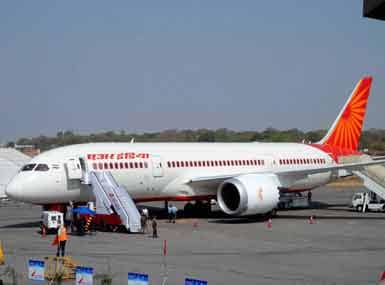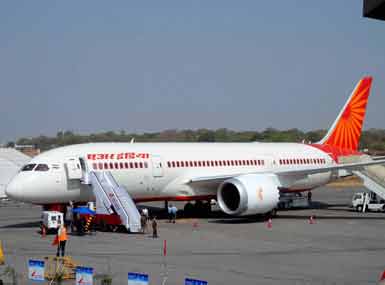In a speech on 16 April, 2018 at the Bombay Stock Exchange on the Indian Economy and Economic Policies, Rashtriya Swayamsevak Sangh (RSS) chief Mohan Bhagwat said that the government shouldn’t sell more than 49 percent of national carrier Air India (AI) – currently on the block, with the government willing to sell 76 percent of that company. Bhagwat’s sentiment echoes that of many people who believe that we should have a national carrier. Political interest in maintaining a national carrier is not new; in 2004, the Naresh Chandra Committee on Civil Aviation observed that the focus of discussion around the privatisation of Air India and Indian Airlines was the need for having a government-owned national carrier. Indian Airlines was merged into Air India (AI) in 2007, and since then a profit-making AI went on to become the heavily-debt laden (Rs 50,000 crore and counting) loss-making entity it now is. Fast forward to today, and interest in the deal – the sale of Air India, Air India Express (the budget airline) and AI-SATS (a 50:50 joint venture with a gateway services and ‘food solutions’ provider) as one entity – is not exactly bubbling. Domestic Airlines such as Jet Airways and Indigo have withdrawn from biddiing, and SpiceJet said the purchase would be well beyond its means. Bhagwat’s concern – as expressed in his speech – was that many countries limit foreign ownership in national airlines to 29 percent, adding that he was told that Germany allowed 49 percent. His information, however, was not complete. In 1987, British Airways had an initial public offering or IPO, that was oversubscribed 11 times. Lufthansa – the German airline that Bhagwat referred to had an IPO in the 1990s, as did Iberia (in 2001). KLM became 100 percent privately owned in 1998. [caption id=“attachment_4382021” align=“alignleft” width=“385”]  Air India. File image. PTI[/caption] Advocates for a government-owned national airline advance two basic arguments: The national brand recognition and value, and tourism. Both happen to be wrong, from the available evidence. Indian private sector brands have done far more for India’s reputation overseas than AI; they are more recognisable. Passenger traffic – a useful proxy for tourism, released by the Director General of Civil Aviation (DGCA) – shows that Air India is third with just over 13 percent, behind Indigo (39.4 per cent) and Jet Airways (14.6 per cent). Our national airline accounted for just 11 per cent of international travel; of the traffic share among all Indian airlines, Air India’s was just 28 per cent, coming in a distant second after Jet Airways. Foreign airlines accounted for 62 per cent of international travel. There is no business case for a national airline. What will successful privatisation look like then? What can we learn from other countries’ attempts? Depending on the region, a couple of options emerge. The first – and perhaps the most palatable one – is finding a ‘strategic investor’. The only problem (politically) is that it could be another foreign airline. British Airways bought 25 percent of Australia’s Quantas, and then Quantas went in for an IPO to sell the remaining 75 percent. The result was a doubling of its fleet and a tripling in passenger traffic. Cathay Pacific owns 20 percent of China Airlines, though the government stays firmly in control. We don’t know enough about China Airlines, but the biggest problem with AI will be in addressing three issues: Performance, efficiency and waste. The second option – and probably a politically unpalatable one – will be the sale of a significant stake or a merger. British Airways and Iberia merged to form the International Airlines Group (IAG); subsequently, Qatar Airlines acquired a 20 percent stake in IAG; within our own shores, Etihad Airways acquired a 24 percent stake in Jet Airways. The third is a combination of a sale of a significant stake and an IPO. The only problem is not knowing whether the government will sweeten the deal with other concessions, like a reduction in staff through a voluntary retirement scheme (VRS); staff costs in Air India are almost 12 percent of revenues; it’s not clear if that number includes pension benefits as well. Malaysia offers yet another interesting example that didn’t quite work out. In 1985, 40 percent was sold through an IPO; in 1994, the Malaysian Central Bank sold its 32 percent to a helicopter company, making the government a minority shareholder, which however retained a ‘golden share’. This gave the government veto rights over certain decisions. In 2000, large losses forced the government to take back control, which it consolidated by taking back full control in 2014. Japan Airlines privatised in 1987, but the government bailed it out of bankruptcy in 2010. In the next year, JAL listed on the Nikkei Stock Exchange, with a good outcome. The government recouped its investment. Air India could take a similar risk, but the outcome is much less certain. Fourth, lenders could force Air India to go to the National Company Law Tribunal (NCLT); the scale of the losses certainly justify it. Banks would have to take a big haircut, but that’s not very different from what they have to do in other cases; the government could provide recapitalisation support to the banks concerned. This would raise valuation questions but keep the process transparent. Perhaps the Tatas could bid for it, given that they owned it in the first place. The late Frank Zappa, rock musician and composer – whose band was called The Mothers of Invention – once said that “You can’t be a real country unless you have a beer and an airline”. We don’t have a national beer, and we probably don’t need a national airline either. The opposition to Air India’s sale – whichever way that works out – should step aside and let it go through. (The writer is a senior columnist and former journalist. He tweets @shrisrinivas)
Fast forward to today, and interest in the deal – the sale of Air India, Air India Express (the budget airline) and AI-SATS (a 50:50 joint venture with a gateway services and ‘food solutions’ provider) as one entity – is not exactly bubbling.
Advertisement
End of Article


)

)
)
)
)
)
)
)
)



